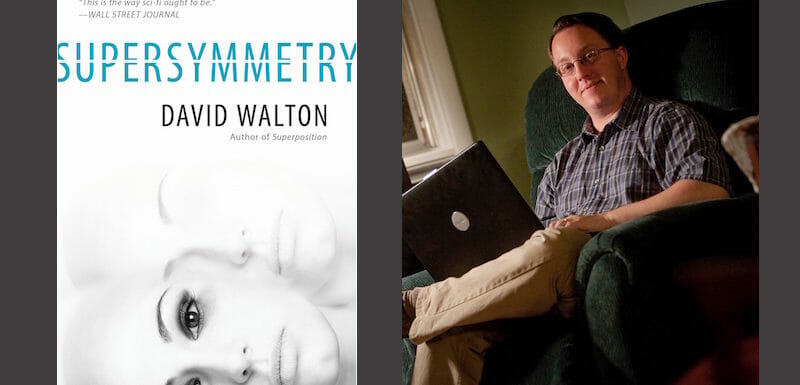 David Walton is an engineer by day, writer by night. HIs day job takes him into a world most people would find mind-bending. He does the same for his fans with his fiction. Walton’s latest release is “Supersymmetry,” a sci-fi thriller with a built-in murder mystery.
David Walton is an engineer by day, writer by night. HIs day job takes him into a world most people would find mind-bending. He does the same for his fans with his fiction. Walton’s latest release is “Supersymmetry,” a sci-fi thriller with a built-in murder mystery.
Walton calls “Supersymmetry” a thriller with a lot of technology. He said, “Writing about technology means I can experiment not just with the tech, but with how that tech affects people and society. Storytellers are like scientists, in a way. A scientist with a new phenomenon will study it under different lights, different environments, different pressures, different temperatures, to try to understand it fully. Storytellers—especially science fiction storytellers—do the same thing, only we do it with the human race.”
Don’t mistake David Walton for another geeky engineer writing sci-fi. He said, “I think great fiction asks big questions in thought-provoking ways, but leaves answering them as an exercise for the reader. I think one of the things that makes storytelling fascinating and valuable is that it forces you to think from the perspective of people who may be very unlike yourself.”
I wanted to try my hand at creating a villain that would stand out in my readers’ minds and memories.
Those differences could include race, gender, age, or even how they came to exist. Walton said, “It can also be more subtle differences in personality and thinking style. Reading helps us to understand the ‘other’. It’s just writing in such a way as to make other people come alive.”
“I’m a voracious reader as well as being a writer,” said Walton. “I can never entirely turn off my writing brain when I’m reading someone else’s book. That means I’m always noticing and analyzing how other writers accomplish the best of what they do. Several books I had read before writing ‘Supersymmetry’ included very memorable villains, and I wanted to try my hand at creating a villain that would stand out in my readers’ minds and memories.”
As Walton pointed out, some villains have no redemptive qualities. For “Supersymmetry,” he wanted one that would be more sympathetic. “He may do horrible things, but we understand his motives, perhaps even see ourselves in him to some extent. More than the first kind, these are the villains that have depth and power. Sometimes we remember them long after we’ve forgotten the heroes.”
I wanted to write about someone who was socially awkward rather than charismatic, someone motivated by small-minded reasons instead of grand ones.
Walton said he wanted to write about a villain who might not at first be recognized as a villain. “I wanted to write about someone who was socially awkward rather than charismatic, someone motivated by small-minded reasons instead of grand ones. Someone who, in other circumstances, we might pity.
“The character I created, Ryan Oronzi, is a brilliant physicist in love with his work. His life is strictly limited by his multiple phobias—fear of flying, fear of elevators, fear of just about any machine he didn’t design and build himself. He has few friends, and tends to alienate his coworkers, but they put up with him because of his genius. His fears and his loneliness, his resentment, grow over time, turning him from a brilliant man with eccentricities into a villain so wrapped up in his own hurts that he’s unable to empathize with anyone else.”
That means I’m not secretly working on a quantum technology to make soldiers invincible and split hapless civilians into multiple versions of themselves.
Unlike his villain, Walton is a family man. He has seven children and writes in what others might term total chaos. Walton said he finds writing in the midst of family activities brings a sense of lively adventure into his books. While Walton is happy to talk about this family, he’s tightlipped about his work. “I do research and development for one of the largest high-tech defense contractors in the world. A lot of what I work on is either classified or proprietary, so I’m not allowed to work the specifics into my books.”
He quickly added a caveat directly related to “Supersymmetry.” “That means I’m not secretly working on a quantum technology to make soldiers invincible and split hapless civilians into multiple versions of themselves.”
Walton may not be borrowing technology from work to create his books, but he does believe engineering makes him a better writer. “I find that both worlds build on each other,” he said. “One part of my day job is to make technical concepts clear to people who aren’t as immersed in the details as I am. Since my writing is technical in nature, it also involves seeding technical explanations through the books in ways that are both clear to the common reader and interesting to read.
“Scientific storytelling can be tricky, because it’s important for the technology to be clear and believable, but you don’t want any dull information dumps. I’m not satisfied with the science being like taking your vitamins, swallowed in a rush so you can get on to the action. The science itself is fascinating, and if I’m doing my job right, it will be for you, too. I want it to be more like the chocolate chips in your cookie—a central part of what makes the book awesome.”
Learn more about David Walton on his website at davidwaltonfiction.com or read Author David Walton discusses high-tech concepts behind new thriller.


Sounds like a great book for the sci-fi fans out there. What a busy author!